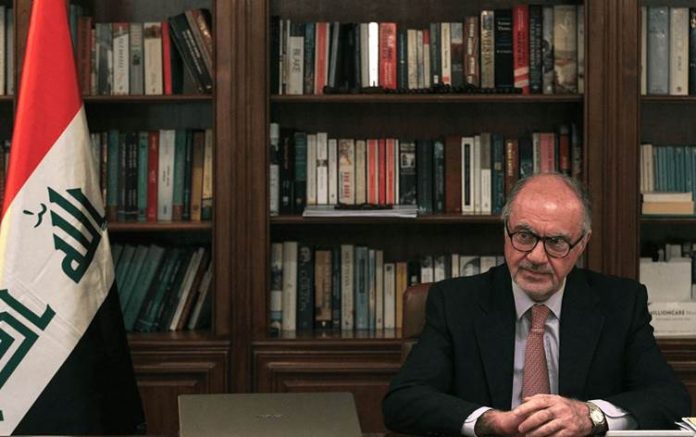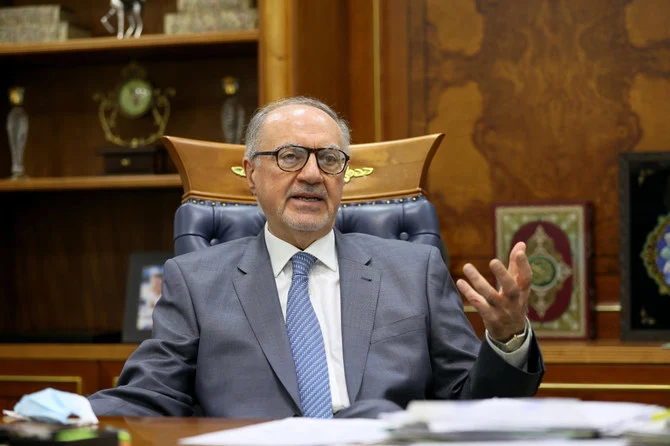Iraq finance minister Ali Allawi resigned during a cabinet meeting on Tuesday to protest the political turmoil in the country.
Iraq’s finance minister resigned on Tuesday, two government officials said, over the country’s worst political crisis in years involving an influential Shiite cleric and his Iran-aligned rivals.
The officials, who spoke on condition of anonymity in line with regulations, said finance minister Ali Allawi resigned during a Cabinet meeting on Tuesday to protest the political conditions. They said Oil Minister Ihsan Abdul-Jabbar will become acting finance minister.
#BREAKING #Iraq’s Finance Minister Ali Allawi has resigned, two sources confirm.
— Lizzie Porterلِيزي بورتر (@lcmporter) August 16, 2022
Allawi’s decision came weeks after members of influential Shiite cleric Muqtada al-Sadr’s parliamentary bloc resigned from parliament and his supporters stormed the parliament building in Baghdad. Al-Sadr later demanded that parliament be dissolved and early elections held.
Al-Sadr won the largest share of seats in the election last October but failed to form a majority government that excluded his Iran-aligned rivals.
READ ALSO: Iran: Zionist regime has no fate other than collapse – FM spox
Al-Sadr’s political rivals in the Coordination Framework, an alliance of Iran-backed parties, said earlier that parliament would have to convene to dissolve itself. They called the al-Sadr supporters’ storming of parliament a “coup” and have held demonstrations in support of the government.
Earlier in the day, al-Sadr postponed demonstrations that were planned by his supporters for Saturday after Iran-backed groups called for similar rallies the same day. That raised concerns about clashes between the two main Shiite rivals in Iraq.
“If you are betting on civil war, I am betting on civil peace. Iraqi blood is invaluable for me,” al-Sadr said in a statement calling for postponing the protests until further notice.
Iraq’s political impasse, now in its 10th month, is the longest in the country since the 2003 US-led invasion reset the political order.
According to a report, the Iraq’s Finance Minister Ali Allawi resigned from his position on Tuesday, at a time of an ongoing political crisis and protests over the failure to form the country’s next cabinet.
Oil Minister Ihsan Abdul Jabbar will fill the vacated position going forward, according to Iraqi state media.
Allawi, who served the position since May 2020, submitted his resignation during a Council of Ministers meeting on Tuesday. The resignation was approved by Iraqi Prime Minister Mustafa al-Kadhimi.
The role of the minister of finance was Allawi’s third ministerial position since the US invasion of Iraq in 2003, having previously filled the posts of Iraq’s minister of defense and minister of trade.
“The text of the resignation shows that the achievements made by the government have been hindered by the struggles of political forces, and that the government is constrained by the deepening conflict between the political forces,” said Hassan Nadhim, the spokesperson of the council of ministers, in a press conference following the meeting, without elaborating on the reason behind the resignation.
Abdul Jabar, Iraq’s oil minister since June 2020, will serve as acting finance minister in Allawi’s place, as tasked by PM Kadhimi during the meeting.
Kadhimi was named as interim prime minister in April 2020 by President Barham Salih, following the resignation of Adel Abdel Mahdi and mass anti-government protests across Iraq.
The resignation comes at a time of ongoing protests and sit-ins staged in Baghdad and several southern provinces over the failure to form a government and ongoing political deadlock.
Kadhimi’s cabinet was supposed to serve until the formation of an elected government, but continues to operate 10 months after the elections, due to the legislature’s failure to form the next cabinet on account of ongoing disagreements between the major political forces in Iraq.
Rudaw moderates all comments submitted on our website. We welcome comments which are relevant to the article and encourage further discussion about the issues that matter to you. We also welcome constructive criticism about Rudaw.
To be approved for publication, however, your comments must meet our community guidelines.
We will not tolerate the following: profanity, threats, personal attacks, vulgarity, abuse (such as sexism, racism, homophobia or xenophobia), or commercial or personal promotion.
Comments that do not meet our guidelines will be rejected. Comments are not edited – they are either approved or rejected.
Click Here to Read The Original Post













